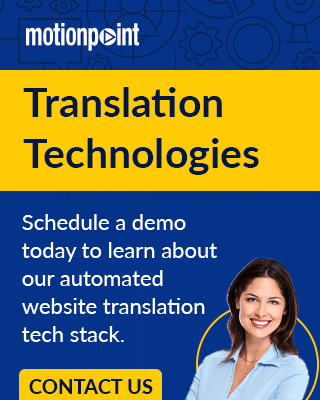Many translation technologies exist to make translation management a more streamlined experience for marketing teams, regardless of size. Recently, we released a post discussing automatic translation and how it relates to the instant translation of content. This post delves into automatic vs. automated translation management technology with proxy translation vs. translation integrations approach for websites.
For businesses to successfully target their multilingual customers on their website, they must first understand how localization technologies are used to manage the translation workflow process and how automation of that process will benefit the company and its teams.
What is Automatic vs. Automated Translation Management?
You can automate the translation workflow for multilingual websites through various translation technologies; some require more effort than others. The key concept to understand is how much effort or involvement your team needs to manage the translation workflow process. Read more about translation workflow and the people and processes behind it.
Automatic translation management is typically tied with the proxy translation approach because the workflow management is done without any internal input and effort from marketing teams. The content localization for the websites, with this approach, is done through continuous translation and is automatic. This allows lean teams to focus on operating their main origin website and focus their efforts on growing the business.
Automated translation management is typically tied with the translation integration approach because the marketing team manages the translation workflow process. The process is automated by the translation integrations such as CMS Connectors or language translation API. Essentially, translation integration offers the benefit of seamless integration into any technology stack and gives robust teams the ability to automate their translation workflow management. This approach removes the manual process, for example, of emailing content for translation, to a more automated workflow process that is managed within the team’s preferred technology stack.
Isn’t Machine Translation Automatic Too?
Machine translation (MT) can be automatic or automated for translating content, but the technology does not manage the translation workflow process. MT instantly translates content from the original source language to the target language without any human input and is part of the automated translation management. While machine translation can provide automatic translation in an instant, some form of localization technologies still needs to be used to integrate and manage content from MT for multilingual websites to happen.
Which Localization Technology is the Right Approach?
The approach to website translation can be as streamlined as you want. The goal of any business and its team is to look for an easy solution for managing their translated content on a multilingual website.
Automatic Translation with the Proxy Approach
Lean teams that are looking to have multilingual websites within 60 days or less need to look for a superior proxy translation technology that will make managing a localized website an effortless experience. Translating content with the proxy translation can be completely automatic, with little to no input from the marketing team to manage the translation workflow.
Automated Translation with the Integrations Approach
Robust teams, including an application administrator, localization managers, and quality control, must look for a seamless translation integration that can easily connect their platform to enable their multilingual websites. Translating content with the translation integrations will be completely automated, with the marketing team managing the translation workflow process.
Both approaches are used for website translation and can reduce the operational complexity and cost of localizing a website.
Content Translation with Proxy & Integrations Approach
Businesses looking to translate content on their websites should select the right translation technology and translation service provider. Technology alone is not enough. Choose a translation service provider that offers quality translation, quick turnaround time, and the right automation translation technology.
Contact MotionPoint today for all your translation and localization needs.
Última atualização: 13 de junho de 2022

